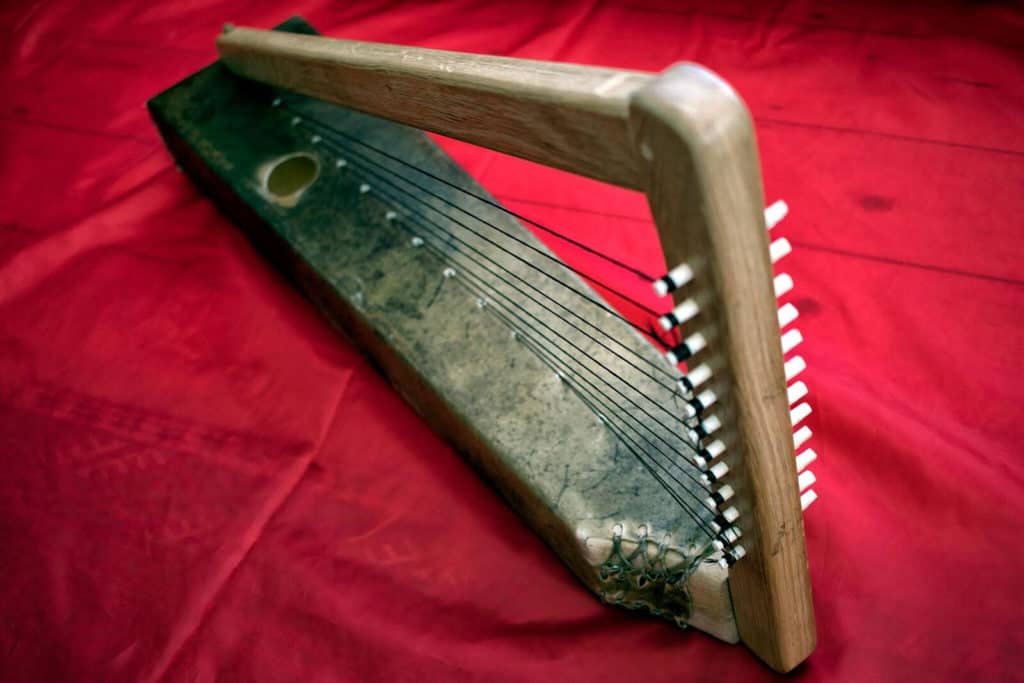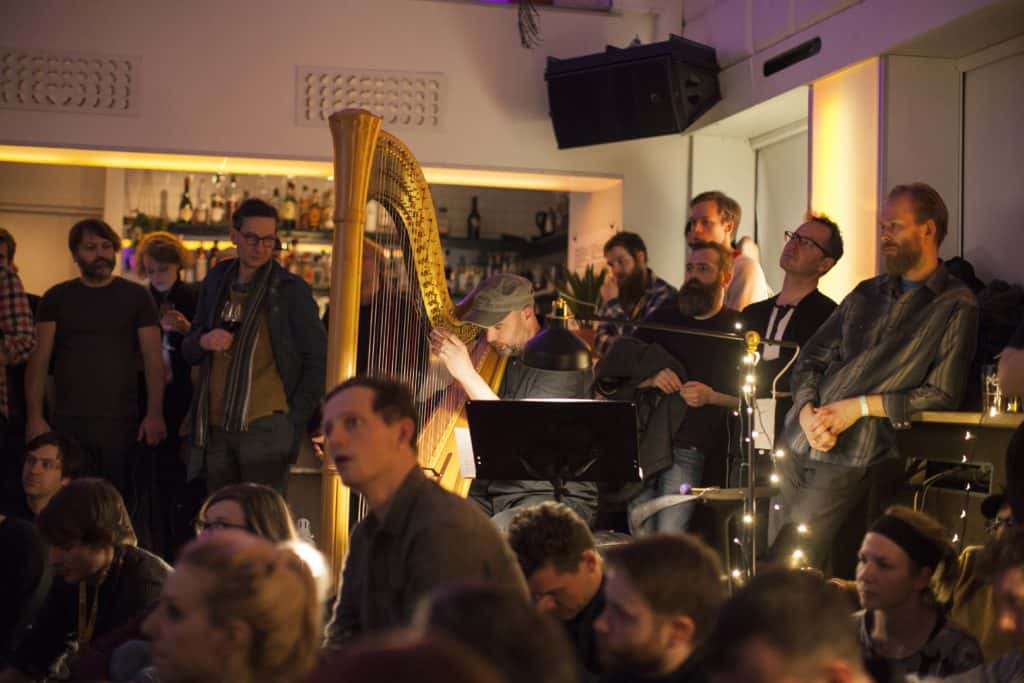Friday is a day when we sent some random questions to our roam festival artists.
Rhodri Davies has replied with insights on language, culture and his musical background, discussing his relationship to harp and improvisation scene.
1. Where were you born? Where do you live?
I was born in Aberystwyth and I now live in Abertawe. That makes it sound as if I have only moved 70 miles south to settle. But in the meantime I have lived in Sheffield and Huddersfield. I lived in London for over 15 years and when I lived in Newcastle Upon Tyne it had a big influence on my music and that is when I met my fellow Hen Ogledd band
members, Sally Pilkington, Dawn Bothwell and Richard Dawson.
2. Where do you want to visit if you could choose and why ?
At the moment I would love to visit just about anywhere! I would choose to visit my friends and fellow musicians who I have missed seeing and playing with this last year and a half. I was fortunate to have toured the United States in December 2019, and it would be good to go back there. I had other tours planned and a three year working US Visa which I now have to watch slowly running out. Japan is one of my favourite places to visit and play for the excitement, musicians, food, culture and cities.
3. Where would you like to live if you could choose anywhere and why ?
I sometimes harbour a romantic notion of living in Pencader where my grandfather grew up. But I am pretty certain I would not last long. After Brexit, I would happily live anywhere in Europe. The British Isles have been so diminished by Brexit and its aftermath and the constant narratives of hatred, racism and bigotry. I would like to avoid those for a while. I am a big fan of Brussels and I was thinking of living there at one point. Its people and architecture are a mystery that slowly reveals itself with each visit. During the pandemic, I have been learning Polish and German on Duolingo, and spending time in both those countries would help advance my development.
4. What is the first record / CD you ever bought ?
The first single I asked my parents to buy me was ‘Chi Mai’ by Ennio Morricone when I was seven. It was the theme tune for the TV series ‘The Life and Times of David Lloyd George’. The second single was ‘Flambards Theme (Variations of a 3½ Bar Whistle)’ by David Fanshawe from another television series. I was obsessed by both those melodies and the whistling from the Flambards theme was one of the first real earworms I encountered. The man whistling on the Flambards theme was John O’Neill who was a BBC session whistler and singer. As it happens, he also whistled on Morricone’s soundtrack of ‘The Good, the Bad and the Ugly. I think the first single I bought myself was either Ceffyl Pren’s ‘Collasant eu Gwaed – Roc ar y Radio’ or Diawled’s ‘S.O.S. – Llinos yn y Lleder Du’! Around that time, I had asked my aunt for Meat Loaf’s ‘Bat Out of Hell’ for Christmas and I was devastated when she deemed it unsuitable and bought me Cliff Richard’s ‘Wired for Sound’ instead.
5. What made you play the harp originally and what made you want to get into more experimental playing of the instrument?
It always takes me by surprise when Eliane Radigue says to me ‘You were born with the harp in the cradle’. I think there was some inevitability to my choosing the harp. And not wishing to draw too many parallels with Harry PoDer’s choice of wand, there is some sense that instruments choose you. I always wanted to play different music on the harp, but it has taken many years of searching to think what that might look or sound like. Now experimental and improvised music seems the most natural way to make music.
6. Who would you like to meet (alive or dead, Jesus, Einstein, any figure!) if you could? And what would you like to ask them / talk about?
Albert Ayler. There is so little documentation about Ayler I would have a whole host of questions and I would love to see him play live.
7. You are bilingual. Do you feel you are the same person when you talk in Welsh and English ? What differences are there in terms of grammar and conversation?
I was brought up speaking Welsh and English and I also speak Wenglish which is a mashup of both languages. I am aware that my accent is prone to change depending on where I live. Growing up, I was often disappointed by some Welsh figures who would move to London and then change their accent in obvious ways. But I am also guilty of that, and my accent can change depending on whomever I am speaking to at the time. Either I have multiple personalities or I have a keen ear for accents. Regarding grammar, I am not the best person to ask. I was always annoyed by people in school who policed my grammatical errors. This is a thing in the Welsh language, and I rebelled against it and I would purposefully not learn the grammatical rules and relish using the wrong mutations, or English idioms.
8. Your Telyn Rawn is so mesmerising and we cannot wait to hear the performance! Are they actually composed or improvised pieces?
Thank you. All the music on the ‘Telyn Rawn’ album was improvised without any musical material decided upon before the moment it was played live in the studio. However, there was much preparation beforehand. I designed and had a Telyn Rawn built, which was a long forgotten instrument. I experimented with different horse hair strings, read historical texts and poetry about this instrument, learnt the techniques and some music from the Robert ap Huw manuscript, researched the importance of the horse and horse cults in Welsh culture and attended local folk sessions at Ty Tawe in Abertawe. All this was an attempt to soak up as much as possible and see what came out in the improvisations.
9. Is there any mythical/historical story behind using a horse body to make this harp?
A telyn rawn is a harp strung with horse-hair and predates the appearance of the triple, lever and pedal harps in Wales. The earliest reference to this early Welsh harp can be found in the Laws of Hywel Dda (13th century), the codification of traditional Welsh laws. It is this harp that has been heard in Wales for the longest period of time, yet it remains largely unknown to contemporary audiences. One of the last references to a telyn rawn made in Wales was from around two hundred years ago. This harp was often documented in Welsh poetry. In the 14th century, Iolo Goch (c.1325-c.1398), wrote a poem called “Praise of the Horsehair Harp and Satire on the Leather Harp”. The telyn rawn was a paean to the horse, which may have harked back to Pagan horse cults. The horse has a strong resonance in Wales: for example The Mari Lwyd and the ‘Triads of the Horses’ that can be found within ‘The Triads of the Island of Britain’. The author T Llew Jones in his book ‘Hen Gof’ (1996) writes about five horse skulls being found in the foundations of a farm in Llanilar – and this is reminiscent of Neolithic practice. When listening back to the album I get a strong sense that the spirit of the horse can be heard on some of the tracks.

roam // OverHear 01 : Rhodri Davies (limited to 30 places)
16th September / 19:00 – 20:00
YouTube DJ Rhodri Thursday Night-Out (on zoom) – BOOK HERE
Rhodri will be selecting his recent and old favourite music pieces on YouTube. He will DJ, chat and share some thoughts and stories with you, then respond to your questions!
roam // night 01 : Rhodri Davies & Rebekah Alero – BOOK HERE (limited to 30 audiences)
11th September / 19:00 – 21:00
@ dai hall, Victoria Lane, unit 29/30 The Piazza Centre, Huddersfield, HD1 2QF


